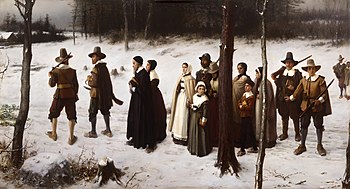Pilgrims
From Wikipedia, the free encyclopedia.
- This article is about the colonists of North America. For religious travelers in general, see Pilgrim. For the football teams of this nickname, see Plymouth Argyle F.C. and Boston United F.C..

The Pilgrims were a group of English religious separatists who sailed from Europe to North America in the early 17th century, in search of a home where they could freely practice their Puritan style of religion, and live according to their own laws.
Experiences and politics in Europe
The various members of the group had broken away from the Church of England, feeling that the Church had not completed the task begun by the Reformation. Under the guidance of the Reverends William Brewster, Richard Clifton and John Robinson, a portion of the group left their homes in and around Scrooby, England and sailed to Amsterdam in Holland to escape religious persecution at the hands of the religious and civil authorities of their countrymen. These separatist Puritan "Pilgrims" settled in Leiden for 12 years, but by 1617 a poor economy, and concern about the Dutch influence upon their community convinced many of them to move on, this time to the New World.
Concerned with the morals of the time in the Netherlands, and with their children's being brought up in a Dutch environment (the Pilgrims wanted to remain culturally Englishmen), they decided to move to a place better-suited to them; and in 1620, they set sail on the ship Mayflower from Plymouth Harbour, bound for the Americas. These people became known as the Pilgrim Fathers.
Another way of explaining the atmosphere in the Netherlands is that some of the exiles, such as Brewster, were publishing what the English government saw as "seditious" books, and were sending them into England (see John Lilburne). The English authorities put diplomatic pressure on the Dutch government to stop it; the Dutch government began to comply, and the exiles decided that it was time to leave.
With hindsight, it is natural to regard the Spanish threat to England as dealt with by the defeat of the Armada of 1588, but this was not the only, nor last threat from that quarter (there were other "armada's" in other years; the Gunpowder Plot occurred in 1605), and suspicion of Spanish intentions continued into the reign of James I of England, if only in the minds of the English, as a conditioned response to the hard-line policy of the by-then, dead king Philip II of Spain. The English government was thus trying to plot a political-religious course between the position of the Roman Catholic, Philip III of Spain and the "Puritan" Congregationalism advocated by Brewster and others.
At the time, fewer than half of the Puritan Congregation's members chose to leave the Netherlands aboard the Speedwell and sail to Southampton, England, where they joined a larger group of religious separatists aboard the Mayflower. After stopping at Plymouth, England, they departed on September 6, 1620, with 102 people aboard. Their intended destination was a section of land in the area called Northern Virginia, granted by one of the Brewster family friends in the London Company. This grant would have placed them near the Hudson River.
Arrival in America
Forced off-course by typical North Atlantic weather, the Mayflower arrived at Cape Cod after 65 days at sea, and anchored off present-day Truro on November 21, 1620.
Realizing that it would require a significant additional voyage to reach their goal, the Pilgrims chose to abandon their original plans, and to form a community where they were. Having no legal authority to colonize the area, they met to sign their own charter, known as the Mayflower Compact, in which they agreed to form a "self-governing, Christian community". It was not long before the Pilgrims determined that the sandy land of the outer cape was insufficient to support them, so a group of them sailed across Cape Cod Bay and landed at Plymouth on December 21. The bulk of the settlers followed six days later.
See also
The Pilgrimage of Grace was in the region surrounding Scrooby, along the Humber.

